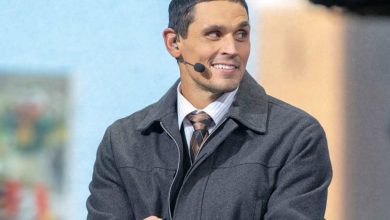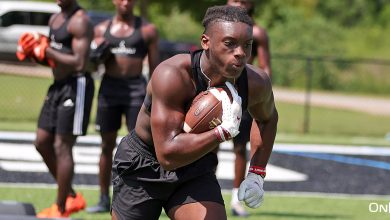It wouldn’t be the first time that Arizona hosts the Los Angeles Rams vs. Minnesota Vikings game because of wildfire.

When the National Football League (NFL) made the decision to move the NFC Wild-Card playoff game between the Minnesota Vikings and Los Angeles Rams to Arizona in January 2025 due to destructive wildfires in Los Angeles, it may have felt like an unprecedented event. However, this wouldn’t be the first time that Arizona has stepped in as the host for a Vikings vs. Rams game due to wildfires in California. The history of both teams, as well as the increasing frequency and intensity of wildfires in the western United States, has created a scenario in which Arizona has played host to a game that was originally scheduled for Los Angeles. The unique circumstances that led to the NFL’s decision to relocate the game in 2025 were eerily familiar to a similar situation a few years prior, when a wildfire in California once again forced the league to find a neutral site to host a critical matchup.
This article will explore the historical context of the NFL’s decision to move games due to wildfires, highlighting the similarities between past incidents and the 2025 Wild-Card game. By revisiting a similar case and examining how the NFL navigates the complexities of relocating games, we can better understand the larger implications of such decisions on the league, its teams, and its fans. Arizona’s role as a contingency host and the growing impact of climate change will also be discussed, providing a comprehensive look at how the NFL has adapted to the challenges posed by natural disasters.
The Growing Threat of Wildfires in California
California, particularly the areas surrounding Los Angeles, has long been susceptible to wildfires due to a combination of dry conditions, high winds, and the region’s Mediterranean climate. Over the years, these fires have become more frequent and severe, exacerbated by the effects of climate change, making it increasingly difficult to predict and manage fire seasons.
In 2020, California experienced one of its worst wildfire seasons on record. The fire season was prolonged and destructive, with millions of acres of land burned and hundreds of thousands of people displaced. The fires that year directly impacted the communities of Los Angeles and surrounding areas, affecting not only residents but also major events, including the NFL’s preparations for games in the region.
One of the most notable impacts of the 2020 wildfire season was on the Los Angeles Rams’ home games at SoFi Stadium, which was then under construction. The stadium was slated to host several key games for the Rams, but due to poor air quality and the threat of wildfires encroaching upon the city, the NFL had to make difficult decisions about moving games to alternative locations. At the time, the league worked closely with local and state officials to ensure the safety of the players and the general public, ultimately relocating games to other cities in the league’s network.
Arizona’s State Farm Stadium in Glendale, which is home to the Arizona Cardinals, was one of the venues selected to host these relocated games. The facility’s modern infrastructure and ability to accommodate a large crowd made it an ideal choice. More importantly, Arizona’s climate, which is less prone to wildfires compared to California, ensured that the air quality and overall safety of the event would not be compromised.
The 2020 Los Angeles Rams vs. Minnesota Vikings Game in Arizona
One of the more memorable incidents in recent NFL history involved the relocation of the Los Angeles Rams vs. Minnesota Vikings game during the 2020 season. That year, the wildfires in California escalated to a point where SoFi Stadium, which was slated to host several games, could not guarantee a safe environment for players and fans. The fires, which were still burning in many parts of California in mid-November, caused local officials to declare health and safety concerns, particularly regarding the poor air quality that plagued Los Angeles.
To ensure the game would still go on as scheduled, the NFL took the unusual step of moving the game between the Vikings and Rams to Arizona. This was not just an isolated incident but part of a broader trend of relocating games due to environmental challenges, a development that many fans and players hadn’t expected. The decision to move the game to Arizona was met with a mix of confusion and support, but ultimately, the relocation allowed for the game to continue as planned.
Arizona’s State Farm Stadium hosted the Vikings and Rams in a packed, neutral environment that was far from the normal hustle and bustle of Los Angeles. Both teams, used to playing in their home stadiums with the support of their fans, had to adapt to the unfamiliar surroundings. Fans, too, faced challenges in rebooking travel and finding accommodations in Arizona instead of California. However, despite the logistical challenges, the game played out without significant disruptions.
For the Vikings, the relocation of the game didn’t seem to affect their performance too much. Minnesota was able to keep pace with the Rams, but ultimately, they fell short, losing the game 34-31. While it wasn’t a postseason contest like the 2025 matchup, the relocation raised important questions about how the NFL might handle similar situations in the future. The stakes were high, and the players’ safety was the top priority for the league, as evidenced by the swift decision-making process that led to Arizona hosting the game.
Arizona’s Role as a Contingency Location
Since 2020, Arizona has cemented its place as a backup location for NFL games impacted by wildfires, primarily because of its relative safety from the fire-prone conditions seen in California. Arizona has hosted games for both the Rams and the Vikings on at least two notable occasions, proving to be a reliable neutral site for teams that otherwise would have played at home stadiums threatened by environmental disasters.
The decision to continue utilizing Arizona as a neutral site for NFL games is a practical one, but it also speaks to the evolving nature of the league’s flexibility and preparedness in the face of natural disasters. By having contingency plans in place, the NFL has been able to avoid further disruption to the schedule, which is critical in a league that operates under tight time constraints and has an established playoff structure.
For the Arizona Cardinals, hosting out-of-town games is an opportunity to showcase State Farm Stadium and the state of Arizona to a larger national audience. However, it also raises questions about the long-term implications of such relocations. While Arizona has been a reliable backup, it also serves as a reminder of the growing frequency of natural disasters and how they can interfere with not only football games but also the lives of fans and players.
The 2025 NFC Wild-Card Game: A Familiar Scenario
In January 2025, the NFL found itself in a similar situation, this time involving the Vikings and Rams in a high-stakes playoff game. Wildfires in Los Angeles had once again escalated to dangerous levels, forcing the NFL to relocate the game to Arizona. While this was a major decision, it wasn’t an entirely unfamiliar scenario. For many players, coaches, and fans, this decision would bring back memories of the 2020 season, when a Vikings vs. Rams game had already been moved to Arizona due to wildfires.
The 2025 scenario, however, was different in that the stakes were significantly higher. A playoff game, rather than a regular-season contest, would determine who advances to the next round of the postseason. The magnitude of the game added an extra layer of complexity for both teams. The Vikings, coming off a 14-win season, and the Rams, having overcome some inconsistencies, were both hungry for postseason success. The neutral-site factor would erase any potential home-field advantage the Rams might have enjoyed, and players would have to adjust to a different environment under even more intense pressure.
Additionally, while the situation mirrored the one in 2020, the sheer scale of the relocation process was larger. More fans, more media, and more resources were required to facilitate the move, with only a few days’ notice to prepare. Arizona’s State Farm Stadium was once again selected to host the game, and while both teams were forced to adjust to new conditions, the league’s swift action ensured that the game could proceed on schedule.
The Broader Impact of Wildfires on Sports
The repeated need to move NFL games due to wildfires in California reflects a larger trend of natural disasters affecting sporting events worldwide. Wildfires in the western United States are becoming more frequent, more intense, and harder to predict, posing a significant risk to not only the NFL but also other sports leagues. The logistics of moving games, the economic impact on fans, and the long-term environmental effects are all factors that must be considered when deciding whether to relocate games.
Moreover, the league is increasingly finding itself at the intersection of sports and climate change. The growing threat of wildfires and other natural disasters is forcing the NFL, like many organizations, to reassess its scheduling and venue policies. Arizona has proven to be an essential partner in this regard, offering a safe haven for displaced games. However, the ongoing threat of environmental factors could eventually lead to broader changes in how the NFL approaches its scheduling and logistics.
For fans, the experience of attending a game at a neutral site—rather than a home stadium—has been a mixed bag. While some appreciate the opportunity to visit a new city and experience the game from a different perspective, others feel disconnected from the sense of home-field advantage and the traditional rivalry atmosphere. This dichotomy is likely to continue in the coming years as the league adapts to new challenges.









